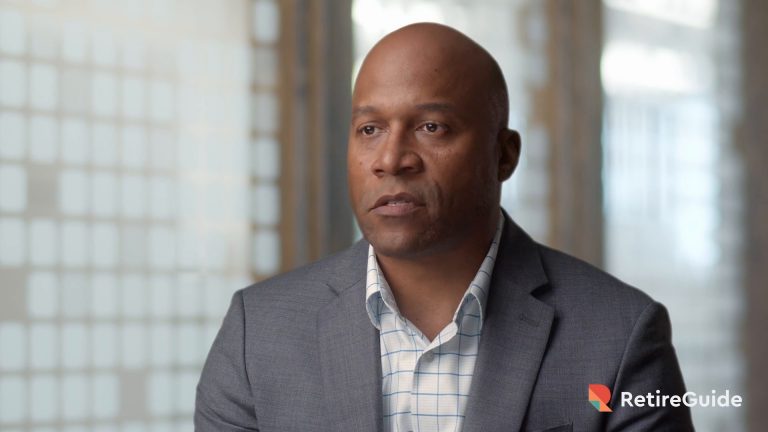Medicare FAQ
It can be complicated to figure out your best options under Medicare. But understanding the basics — enrollment, eligibility, costs and health care coverage — can help you take control of and make the best use of your Medicare benefits.

- Written by Terry Turner
Terry Turner
Senior Financial Writer and Financial Wellness Facilitator
Terry Turner has more than 35 years of journalism experience, including covering benefits, spending and congressional action on federal programs such as Social Security and Medicare. He is a Certified Financial Wellness Facilitator through the National Wellness Institute and the Foundation for Financial Wellness and a member of the Association for Financial Counseling & Planning Education (AFCPE®).
Read More- Edited By
Matt Mauney
Matt Mauney
Financial Editor
Matt Mauney is an award-winning journalist, editor, writer and content strategist with more than 15 years of professional experience working for nationally recognized newspapers and digital brands. He has contributed content for ChicagoTribune.com, LATimes.com, The Hill and the American Cancer Society, and he was part of the Orlando Sentinel digital staff that was named a Pulitzer Prize finalist in 2017.
Read More- Reviewed By
Joe Benish
Joe Benish
Licensed Agent at Insuractive
As a licensed insurance agent specializing in providing seniors with Medicare-related products, Joe Benish knows how daunting it can be to learn about Medicare and all of the options available. That’s why he spends his time getting to know his clients and helping them select the right plans for them from the more than 15 insurance companies he represents.
Read More- Published: June 29, 2020
- Updated: October 27, 2023
- 10 min read time
- This page features 8 Cited Research Articles
Medicare Enrollment FAQs
Will I be automatically enrolled in Medicare or do I need to sign up?Many people new to Medicare wonder if they will be automatically enrolled.
In most cases, if you are already receiving benefits from Social Security or the Railroad Retirement Board, you will be automatically enrolled in Medicare Part A and Part B on the first day of the month when you turn 65. If your birthday is the first day of the month, you’ll start receiving it the month before.
If you are not yet receiving Social Security or Railroad Retirement Board benefits, you will have to enroll manually. Your initial enrollment period has a seven-month window — including your birthday month, the three months before and the three months after it.
If you plan to keep your private insurance beyond this period, say through an employer if you are not planning to retire, you need to notify Medicare. You will be able to schedule a special enrollment period later.
When is open enrollment for Medicare?Medicare’s open enrollment period is Oct. 15 through Dec. 7 every year. During this time, you may change your Medicare health plans and prescription drug coverage plans. Information for annual changes to Medicare plans is available in early October.Can I enroll in Medicare if I have a health savings account?A health savings account (HSA) allows you to put aside money that isn’t taxed if you have a high-deductible health plan. Once you enroll in Original Medicare — Medicare Part A and Part B — you can no longer contribute to an HSA.
If you plan to delay enrolling in Medicare until you stop working, be sure to stop contributing to your HSA six months or more before you plan to enroll in Medicare to avoid a tax penalty.
When is the best time to enroll in a Medicare supplement plan?The best time to enroll in a Medicare supplement plan (Medigap) is during your Medigap open enrollment period. This period starts on the first day that you are both 65 or older and enrolled in Medicare Part B.
Can I be enrolled in Medicare if I’m already enrolled in Medicaid?You may be dual eligible to enroll in Medicare and Medicaid if you meet certain financial eligibility requirements. Your eligibility for Medicaid depends on your income and financial resources.
Even if you don’t qualify for Medicaid while enrolled in Medicare, you may still qualify for one of the federally funded Medicare Savings Programs to help people with limited income and resources. You can check with your state’s Medicaid office to determine if you qualify.
Medicare Eligibility FAQs
What are the eligibility requirements for Medicare coverage?If you are 65 years or older, you still have to meet certain other eligibility requirements before you can enroll in Medicare.
First, you have to be a United States citizen or a permanent resident who has lived in the U.S. for at least five years. In addition, you must meet one of the following eligibility requirements:
- You or your spouse has worked at least 10 years and are eligible for either Social Security or Railroad Retirement benefits.
- You or your spouse is a government employee or retiree who has paid Medicare payroll taxes while working.
You can use the Medicare Eligibility Premium Calculator at Medicare’s website to find out if you are eligible for coverage.
Do I have to be on Social Security to get Medicare?You do not have to be on Social Security before you can get Medicare. But you will have to enroll on your own. This means applying for Medicare during your initial enrollment period. This is a seven-month period including your 65th birth month plus the three months before and after it.
You may be responsible for a permanent surcharge on your Medicare Part B and Part D premiums if you miss that window.
You can enroll in Medicare through the Social Security website.
Am I eligible for a Medicare Supplement (Medigap) plan?You must first be enrolled in Medicare before you are eligible for a Medicare supplement insurance plan, sometimes called Medigap. You are eligible to buy Medigap coverage during a six-month Medigap open enrollment period.
If you wait until the open enrollment period passes, it may cost more to buy a Medicare supplement insurance plan in the future, or you could be denied based on current or past health issues. You are not able to purchase both a Medigap and a Medicare Advantage (Part C) plan.
How do I qualify for Medicare’s Extra Help Program?To qualify for Medicare’s Extra Help program, you must meet certain financial need requirements.
For 2024, your annual income must be limited to $21,870 for an individual and $29,580 for a married couple living together. And there are limits regarding your financial resources as well.
Financial resources Medicare considers for Extra Help eligibility include:
- Real estate other than your primary residence
- Bank accounts including checking, savings and certificates of deposit
- Stocks
- Bonds, including U.S. Savings Bonds
- Mutual funds
- Individual retirement accounts (IRAs)
- Cash
If you meet the eligibility requirements and enroll in an Extra Help program, it could be worth about $5,000 a year.
You can apply for Medicare Extra Help at your local Social Security office, by calling Social Security at 1-800-772-1213 (TTY at 1-800-325-0778) or at the Social Security website.
Do I qualify for premium-free Medicare Part A coverage?To be eligible for premium-free Medicare Part A, you have to be 65 years or older and you or your spouse paid Medicare taxes for at least 10 years of your life. They do not have to be consecutive years.
You may also qualify for premium-free coverage if you are 65 or older and meet one of three requirements:
- You are receiving Social Security or Railroad Retirement benefits.
- You are eligible to receive Social Security or Railroad Retirement benefits but have not yet applied for them.
- You or your spouse was employed in a government job that was Medicare-covered.
Terry Turner | 1:19 Why is Medicare so confusing? Have you selected your 2023 Medicare plan?Replay VideoSenior financial writer and financial wellness facilitator Terry Turner explains why Medicare is so confusing and how working with a professional can help you make the right decision for your health care needs.
Have you selected your 2023 Medicare plan?Replay VideoSenior financial writer and financial wellness facilitator Terry Turner explains why Medicare is so confusing and how working with a professional can help you make the right decision for your health care needs.Medicare Coverage and Benefits FAQs
What is the difference between Original Medicare and Medicare Advantage plans?Original Medicare — Medicare Part A and Part B — is a federal government program. Medicare Advantage plans are administered by private insurance companies that contract with the federal Medicare program.
There are several differences. Under Original Medicare, you can go to any doctor, hospital or other health care provider that accepts Medicare. Medicare Advantage plans may charge you more or require you to pay full cost out of your own pocket if you go to providers outside their networks.
Medicare Advantage plans are required to provide all coverage provided in Original Medicare, but plans may provide additional coverage not included in Parts A and B such vision, dental, hearing and prescription drug coverage.
Does Medicare cover nursing home care or assisted living services?Medicare does not cover most nursing home care. Custodial care, which includes helping you with daily activities such as bathing, dressing, eating or using the bathroom, is not covered.
Medicare Part A may cover skilled nursing facility care, but it must be certified and your care must be medically necessary.
Original Medicare may also provide some home health care coverage.
Home health care services covered by Original Medicare include:
- Injectable osteoporosis drugs for women
- Occupational therapy
- Part-time or intermittent home health aide services providing personal, hands-on care
- Part-time or intermittent skilled nursing care
- Physical therapy
- Speech-language pathology services
Am I covered if I receive medical care when traveling?If you’re traveling within the United States and its territories, Original Medicare will pay for hospitalization and medical services at any provider that accepts Medicare. Coverage may vary depending on terms of Medicare Advantage plans.
With just a few exceptions, Medicare usually doesn’t cover medical care if you are traveling outside the United States, Puerto Rico the U.S. Virgin Islands, Guam, the Northern Mariana Islands or American Samoa.
It may pay for care you receive aboard a ship in U.S. territorial waters, but not if the ship is more than six hours from port.
Medicare may pay for inpatient hospital care, ambulance services or dialysis you receive in a foreign country in rare circumstances such as:
- You’re in the U.S. when a medical emergency requiring immediate attention happens and a foreign hospital is closer or the nearest U.S. hospital cannot treat your condition.
- You’re travelling through Canada without delay on the most direct route between Alaska and the lower 48 U.S. states when a medical emergency happens and a Canadian hospital is the nearest option.
- You live in the United States and the nearest hospital to your home is closer than any in the U.S. that can treat your condition.
Is my medication covered by Medicare Part D?Medicare Part D prescription drug plans cover both generic and brand name drugs. Part D plans are sold by private insurers which contract with Medicare.
Plans create their own formularies — an official list of the medicines that they will cover.
All plans are required to cover the same categories of prescription medicines, but plans are typically allowed to choose which drugs in any category they cover. Your specific medication may not be covered but an alternative may be covered.
You can review Medicare Part D prescription drug plans and see if one covers a particular medication at Medicare’s Plan Finder.
Does Medicare cover funeral and burial costs?Medicare does not pay for funeral or burial costs.
Social Security does pay a survivors benefit, a one-time payment to the deceased’s beneficiary that can be used toward funeral costs.
You should also report the death of a loved one on Medicare. You will need to have the person’s Social Security number and call Social Security at 1-800-772-1213 (TTY: 1-800-325-0778).
Will Howery, MBA | 1:05 What are some common misconceptions about Medicare? Get Free Help Pricing and Building Your Medicare PlanReplay VideoLearn some of the most common misconceptions about Medicare from William Howery, a Medicare expert who has a decade of experience in the insurance industry.
Get Free Help Pricing and Building Your Medicare PlanReplay VideoLearn some of the most common misconceptions about Medicare from William Howery, a Medicare expert who has a decade of experience in the insurance industry.Medicare Costs FAQs
What is the standard premium for Medicare?Most people don't pay a premium for Medicare Part A, but in 2025, the standard premium for Medicare Part B is $185 per month.
Premiums for Medicare Advantage plans and Part D prescription drug plans vary based on the plan.
Can I use my existing HSA to pay for medical expenses and Medicare costs?You are no longer allowed to contribute money to your health savings account (HSA) once you enroll in Medicare, but you can continue using money already in your HSA to pay out-of-pocket Medicare costs, such as Part A, B, C or D premiums, medical copays/coinsurance or dental copays. An HSA cannot be used for dental or Medicare supplement premiums.Can I deduct Medicare premiums on my tax return?You can deduct some of your Medicare premiums on your federal taxes in certain circumstances.
If you are self-employed, the IRS allows you to deduct all Medicare premiums from your federal taxes. This includes premiums for Medicare Part A, Part B, Medigap, Medicare Advantage plans and Medicare Part D prescription drug plans.
If you are not self-employed, you have to file an itemized Schedule A (1040) tax return listing all your medical expenses for the tax year. But you can only deduct the amount of expenses over 7.5 percent of your adjusted gross income.
How much do Part D prescription drug plans cost?Medicare Part D prescription drug plan premiums vary depending on the plan. In addition, Medicare requires higher income individuals and married couples to pay an extra fee based on their income. You should compare prices to find the best price for your needs.
What financial assistance is available to help pay Medicare costs?There are several programs in place to help people pay out-of-pocket expenses for Medicare, including:
- PACE (Program of All-inclusive Care for the Elderly)
- Medicare Extra Help program
- State Health Insurance Assistance Program (SHIP)
- Medicaid, including dual eligibility in Medicare and Medicaid
- Medicare Savings Programs (MSP); there are four of these based on your financial need and situation
- Supplemental Security Income (SSI), administered through the Social Security Administration
Last Modified: October 27, 2023Share This Page8 Cited Research Articles
- Centers for U.S. Medicare & Medicaid Services. (2023, October 12). 2024 Medicare Parts A & B Premiums and Deductibles. Retrieved from https://www.cms.gov/newsroom/fact-sheets/2024-medicare-parts-b-premiums-and-deductibles
- Medicare.gov. (2023). Help With Drug Costs. Retrieved from https://www.medicare.gov/basics/costs/help/drug-costs
- U.S. Centers for Medicare & Medicaid Services. (2022, September 27). 2023 Medicare Parts A & B Premiums and Deductibles 2023 Medicare Part D Income-Related Monthly Adjustment Amounts. Retrieved from https://www.cms.gov/newsroom/fact-sheets/2023-medicare-parts-b-premiums-and-deductibles-2023-medicare-part-d-income-related-monthly
- U.S. Social Security Administration. (2022). Frequently Asked Questions; Medicare. Retrieved from https://faq.ssa.gov/en-US/topic/?id=CAT-01092
- Lankford, K. (2017, May). FAQs About Medicare. Retrieved from https://www.kiplinger.com/article/insurance/t027-c000-s002-faqs-about-medicare.html
- U.S. Centers for Medicare & Medicaid Services. (2016, May). Get Your Medicare Questions Answered. Retrieved from https://www.medicare.gov/sites/default/files/2018-07/11386_-medicare-questions-answered.pdf
- U.S. Centers for Medicare & Medicaid Services. (n.d.). Find a Medicare Plan. Retrieved from https://www.medicare.gov/plan-compare/#/?lang=en
- Kaiser Family Foundation. (n.d.). Medicare Open Enrollment FAQs. Retrieved from https://www.kff.org/faqs/medicare-open-enrollment-faqs/?view=1
- Edited By
Calling this number connects you to one of our trusted partners.
If you're interested in help navigating your options, a representative will provide you with a free, no-obligation consultation.
Our partners are committed to excellent customer service. They can match you with a qualified professional for your unique objectives.
We/Our Partners do not offer every plan available in your area. Any information provided is limited to those plans offered in your area. Please contact Medicare.gov or 1-800-MEDICARE to get information on all of your options.
888-694-0290Your web browser is no longer supported by Microsoft. Update your browser for more security, speed and compatibility.
If you need help pricing and building your medicare plan, call us at 844-572-0696


